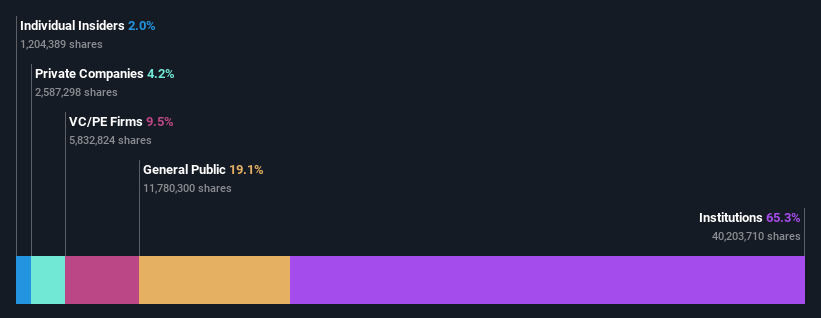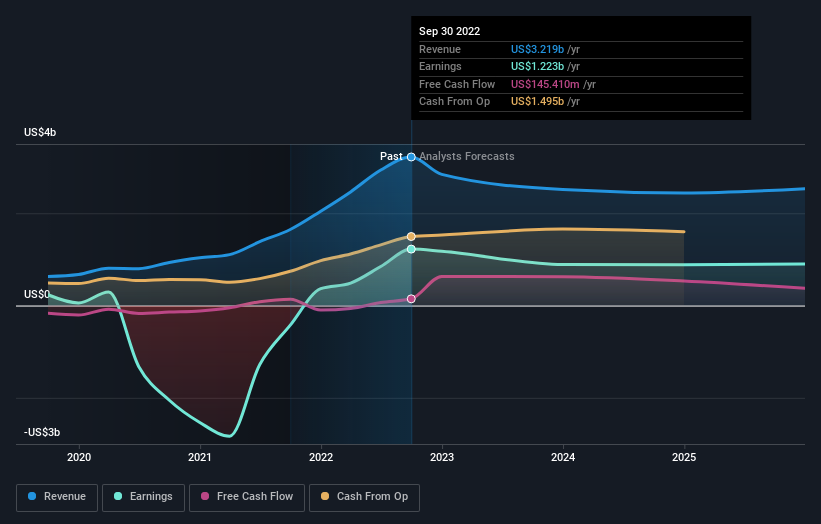Great week for Callon Petroleum Company (NYSE:CPE) institutional investors after losing 30% over the previous year

Key Insights
- Significantly high institutional ownership implies Callon Petroleum’s stock prices are sensitive to their trading actions.
- The top 9 shareholders own 51% of the company
- Ownership research along with analyst forecasts data help provide a good understanding of opportunities in a stock
If you want to know who really controls Callon Petroleum Company (NYSE:CPE), then you’ll have to look at the makeup of its share registry. With 65% stake, institutions possess the maximum shares in the company. In other words, the group stands to gain the most (or lose the most) from their investment into the company.
Institutional investors would appreciate the 12% increase in share prices last week, given their one-year returns have been disappointing at 30%.
Let’s take a closer look to see what the different types of shareholders can tell us about Callon Petroleum.
Check out our latest analysis for Callon Petroleum

What Does The Institutional Ownership Tell Us About Callon Petroleum?
Institutional investors commonly compare their own returns to the returns of a commonly followed index. So they generally do consider buying larger companies that are included in the relevant benchmark index.
As you can see, institutional investors have a fair amount of stake in Callon Petroleum. This suggests some credibility amongst professional investors. But we can’t rely on that fact alone since institutions make bad investments sometimes, just like everyone does. When multiple institutions own a stock, there’s always a risk that they are in a ‘crowded trade’. When such a trade goes wrong, multiple parties may compete to sell stock fast. This risk is higher in a company without a history of growth. You can see Callon Petroleum’s historic earnings and revenue below, but keep in mind there’s always more to the story.

Institutional investors own over 50% of the company, so together than can probably strongly influence board decisions. We note that hedge funds don’t have a meaningful investment in Callon Petroleum. BlackRock, Inc. is currently the company’s largest shareholder with 13% of shares outstanding. For context, the second largest shareholder holds about 11% of the shares outstanding, followed by an ownership of 9.5% by the third-largest shareholder.
We did some more digging and found that 9 of the top shareholders account for roughly 51% of the register, implying that along with larger shareholders, there are a few smaller shareholders, thereby balancing out each others interests somewhat.
Researching institutional ownership is a good way to gauge and filter a stock’s expected performance. The same can be achieved by studying analyst sentiments. Quite a few analysts cover the stock, so you could look into forecast growth quite easily.
Insider Ownership Of Callon Petroleum
The definition of an insider can differ slightly between different countries, but members of the board of directors always count. Company management run the business, but the CEO will answer to the board, even if he or she is a member of it.
Insider ownership is positive when it signals leadership are thinking like the true owners of the company. However, high insider ownership can also give immense power to a small group within the company. This can be negative in some circumstances.
Our most recent data indicates that insiders own some shares in Callon Petroleum Company. It is a pretty big company, so it is generally a positive to see some potentially meaningful alignment. In this case, they own around US$48m worth of shares (at current prices). If you would like to explore the question of insider alignment, you can click here to see if insiders have been buying or selling.
General Public Ownership
The general public, who are usually individual investors, hold a 19% stake in Callon Petroleum. While this size of ownership may not be enough to sway a policy decision in their favour, they can still make a collective impact on company policies.
Private Equity Ownership
Private equity firms hold a 9.5% stake in Callon Petroleum. This suggests they can be influential in key policy decisions. Some investors might be encouraged by this, since private equity are sometimes able to encourage strategies that help the market see the value in the company. Alternatively, those holders might be exiting the investment after taking it public.
Private Company Ownership
We can see that Private Companies own 4.2%, of the shares on issue. Private companies may be related parties. Sometimes insiders have an interest in a public company through a holding in a private company, rather than in their own capacity as an individual. While it’s hard to draw any broad stroke conclusions, it is worth noting as an area for further research.
Next Steps:
While it is well worth considering the different groups that own a company, there are other factors that are even more important. Case in point: We’ve spotted 3 warning signs for Callon Petroleum you should be aware of, and 2 of them don’t sit too well with us.
If you would prefer discover what analysts are predicting in terms of future growth, do not miss this free report on analyst forecasts.
NB: Figures in this article are calculated using data from the last twelve months, which refer to the 12-month period ending on the last date of the month the financial statement is dated. This may not be consistent with full year annual report figures.
Valuation is complex, but we’re helping make it simple.
Find out whether Callon Petroleum is potentially over or undervalued by checking out our comprehensive analysis, which includes fair value estimates, risks and warnings, dividends, insider transactions and financial health.
Have feedback on this article? Concerned about the content? Get in touch with us directly. Alternatively, email editorial-team (at) simplywallst.com.
This article by Simply Wall St is general in nature. We provide commentary based on historical data and analyst forecasts only using an unbiased methodology and our articles are not intended to be financial advice. It does not constitute a recommendation to buy or sell any stock, and does not take account of your objectives, or your financial situation. We aim to bring you long-term focused analysis driven by fundamental data. Note that our analysis may not factor in the latest price-sensitive company announcements or qualitative material. Simply Wall St has no position in any stocks mentioned.






